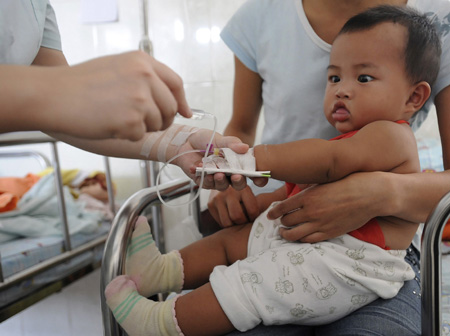 China in the last few years has gotten some bad publicity from exports: milk, toothpaste, dogfood, Barbie Dolls--all tainted and dangerous in some way. For most of it, one simply has to admit that sometimes things go wrong in the sheer mass of exports that China puts out each year. The milk was the boulder that broke the camel's back--when your government has crafted an export-dependent economy, your international image is critical. 54,000 babies sickened by melanine in milk, and some dead--Western and even wealthy Chinese families don't trust the safety and efficacy of Chinese products. If nobody trusts your products, nobody will buy them.
China in the last few years has gotten some bad publicity from exports: milk, toothpaste, dogfood, Barbie Dolls--all tainted and dangerous in some way. For most of it, one simply has to admit that sometimes things go wrong in the sheer mass of exports that China puts out each year. The milk was the boulder that broke the camel's back--when your government has crafted an export-dependent economy, your international image is critical. 54,000 babies sickened by melanine in milk, and some dead--Western and even wealthy Chinese families don't trust the safety and efficacy of Chinese products. If nobody trusts your products, nobody will buy them. This is very bad news for China. It's brought a very large magnifying glass to the export control machinery in its government--and that glass has found little. The term "crisis in confidence"--being tossed around about US financial markets--is surprisingly relevant here. China is overhauling its entire milk industry and oversight bureaucracy to try and restore confidence in its already-strained exports. With oil prices high and real disposable income down, its ships crossing the pacific aren't making as much money as they used to be. The last thing the Chinese Communist Party--which bases its legitimacy in growth--needs is a recession, and it's willing to do anything it can to try to boost buyer confidence in its products. The Chinese government has rounded up 32 people allegedly involved, and whether or not they are is largely inconsequential--they need a scapegoat, they need to be able to say "we got the bad guys, they're gone now."
But China did something strange. This crisis has been so bad that the Chinese government called its own industry "chaotic." It has admitted something is wrong with the way that its country is currently doing things. This is a rare sort of admission that is the closest thing to an apology one is ever going to get out of the Chinese government. They are clearly embarrassed, and a bit humbled: they are not perfect.
Chinese humbling has to come from within. Strong nationalism means that criticism from without will be met with significant backlash, and will feed such nationalism. Trying to shake one's finger at China is seen as insulting and petty, and won't "socialize" the Chinese government, as the US and the West hope to do. China has to learn from its own mistakes the hard way; it must see the consequences of them.
Personally, I would cite the biggest mistake here as the one in which the Chinese government tried to build an export-dependent economy--when you make exports the backbone of your wealth, then drops in exports lead to disaster. But despite the fact that I think the Chinese reaction is not fully economically optimal, it is a good political sign--the Chinese export economy does indeed require China to keep a good reputation abroad. As long as it does not try to overhaul its entire economy to something more mixed or "independent," it will depend on its reputation to keep a strong economy--and the Party needs a strong economy to maintain its one-party legitimacy. If the economy is good, don't shake things up, they say. But if it's bad... why not?
So the Party will continue behaving in the future. A humble China is a peaceful China, and a peaceful China is a wonderful partner for the future, even if it will disagree with the West.
No comments:
Post a Comment